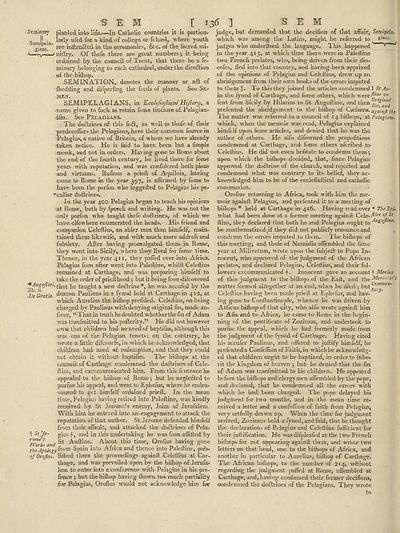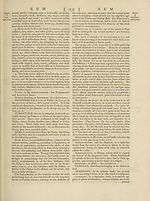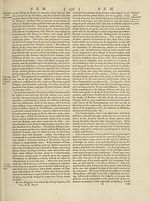Encyclopaedia Britannica, or, a Dictionary of arts, sciences, and miscellaneous literature : enlarged and improved. Illustrated with nearly six hundred engravings > Volume 19, Scripture-SUG
(146) Page 136
Download files
Complete book:
Individual page:
Thumbnail gallery: Grid view | List view

S EM [ 136 1 S E M
S«mina*y planted into life.—In Catholic countries it is particu-
tiernP eh ufcd for a kind of college or fchool, where youth
J<gians.a~ ai’e inftrudled in the ceremonies, &c, of the facred mi-
niftry. Of thefe there are great numbers; it being
ordained by the council of Trent, that there be a fe-
minary belonging to each cathedral, under the direction
* ef the bilhop.
SEMINATION, denotes the manner or aft of
{bedding and difperfing the feeds of plants. See Se¬
men.
SEMIPELAGIANS, in EcelfwjlicalHiJiory: a
name given to fueh as retain fome tinfture of Pelagian-
ifm. See Pelagians.
The doftrines of this- fefl, as well as thofe of their
predecelfors the Pelagians,.have their common fource in
Pelagius, a native of Britain, of whom we have already
taken notice. He is faid to have been but a fimple
monk, and not in. orders. Having gone to Rome about
the end of the fourth century, he lived there for fome
years with reputation, and was confidered both pious
and virtuous, liuinms a prieft of Aquileia, having
come to Rome in the year 397, is affirmed by fome to
have been the perfon who fuggeded to Pelagius his pe¬
culiar doflrines.
In the year 400 Pelagius began to teach his opinions
at Rome, both by fpeech and writing. He was not the
only perfon who taught thefe doflrines, of which we
have elfewhere enumerated the heads. His friend and
companion Celeftius, an abler man than himfelf, main¬
tained them like wife, and with much more addrefsand
fubtlety. After having promulgated them in Rome,
they went into Sicily, where they lived for fome time.
Thence, in the year 4m, they paffed over into Africa.
Pelsgius foon after went into Paleiline, wbilft Celeftius
remained at Carthage, and was preparing himfelf to
take the order of priefthood 5 but it being foon-difcovered
■^Aupjiim, pg taUgljt a new doftrine*, he was accufed by the
l)t Gratia. ^eacon Paulinus in a fynod held at Carthage in 4x2, at
which Aurelius the biihop prefided. Celellius, on being
charged by Paulinus with denying original fin, made an-
fwer, “ That in truth he doubted w hether the fin of Adam
was traufmitted to his pofterity.” He did not however
owa that children had no need of baptifm, although this
was one of the Pelagian tenets: on the contrary, he
wrote a little difcourie, in which he acknowledged, that
children had need of redemption, and that they, could
not obtain it without baptifm. The biffiops at the
oouncii of Carthage condemned the doflrines of Cele-
ilius, and excommunicated him. From this fentence he
appealed to the biihop of Rome •, but he neglefled to
puriue his appeal, and went to Ephefus, where he endea¬
voured to get himfelf ordained prieft. In the mean
time, Pelagius having retired into Paleftxne, was kindly
received by St Jerome’s enemy, John of Jerufalem.
With him lie entered into an engagement to attack the
reputation of that author. St Jerome defended himfelf
from their aifault, and attacked the doflrines of Pela-
T St ye- gjus .f.f and in this undertaking he was foon affifted by
^IVorks an l ^ Auftine, About this time, Qrofius having gone
thedpoiogv bom Spain into Africa and thence into Paleftine, pub-
ofOrofiui'. liilied there the proceedings againft Celeftius at Car¬
thage, and was prevailed upon by the biffiop of Jerufa¬
lem to enter into a conference with Pelagius in his pre¬
fence j but the bithop having fliown teo much partiality
for Pelagius, Qrofius would not acknowledge him for
judge, but demairded that the decifion of that affair, Semipek,
which was among the Latins, might be referred to , Sians.
judges who underftood the language. This happened v J
in the year 415, at which time there were in Paleftine
two French prelates, who, being driven from their dio-
cefes, fled into that country, and having been apprized
of the opinions of Pelagius and Celeftius, drew up an
abridgement from their own books of the errors imputed
to them f. To this they joined the articles condemned 1 St Au-
in the fynod of Carthage, and fome others, which on
lent from Sicily by Hilarius to St Augufiine, and then
prefented the abridgement to the biihop of Cyefarea. againjl the
The matter was referred to a council of 14 brlhops, at Pelagians.
which, when the memoir was read, Pelagius explained
himlelf upon lome articles, and denied that he was the
author of others. He alfo difowned the propofitions
condemned at Carthage, and fome others aferibed to
Celeftius. He did not even hefitate to condemn them 5
upon which the bilhops decided, that, fince Pelagius
approved the doftrine of the church, and rejefled and
condemned what was contrary to its belief, they ac¬
knowledged him to be of the eeclefiaftical and catholic
communion.
Orofius returning to Africa, took with him the me¬
moir againft Pelagius, and prefented it to a meeting of
bifhops * held at Carthage in 416. Having read over * TheEpi.
what had been done at a former meeting againft Cele-/^ °fSt
ftius, they declared that both he and Pelagias ought to All&uyine*
be anathematized pf they did not publicly renounce and
condemn the errors imputed to them. The biffiops of
this meeting, and thofe of Numidia affembled the fame
year at Milivetum, wrote upon the fubjedl to Pope In¬
nocent, who approved of the judgment of the African
prelates, and declared Pelagius, Celeftius, and their fol¬
lowers excommunicated f. Innocent gave an account t Marius
of this judgment to the biftiops of the Eafl, and the Mercator's
matter feemed altogether at an end, when lie died \ but
Celellius having been made prieft; at Ephefus, and hav¬
ing gone to Conftantinople, whence he was driven by
Atticus biffiopiof that city, who alfo wrote againft him
to Alia and to Africa, he came to Rome in the begin¬
ning of the pontificate of Zozimus, and undertook to
purfue the appeal, which he had formerly made from
the judgment of the fynod of Carthage. Having cited
his accufer Paulinus, and offered to juftify himfelf, he
prelented a Confeffion of Faiih, in which he acknowledg¬
ed that children ought to be baptized, in order to inhe¬
rit the kingdom of heaven j but he denied that the fin
of Adam was tranfmitted to his children. He appeared
before the biffiops and clergymen affembled by the pope,
and declared, that he condemned all the errors with
which he had been charged. The pope delayed his
judgment for two months, and in the mean time re¬
ceived a letter and a confeffion of faith from Pelagius,
very artfully drawn up. When the time for judgment
arrived, Zozimus held a fynod, and faid, that he thought
the declarations of Pelagius and Celeftius fufficient for
their juflification. He was difpleafed at the two French
biffiops for not appearing againft them, and wrote two
letters on that head, one to the biffiops of Africa, and
another in particular to Aurelius, bifhop of Carthage.
The African biffiops, to the number of 214, without
regarding the judgment paffed at Rome, affembled at
Carthage, and, having confirmed their former decifions,
•condemned the doctrines of the Pelagians. They w'rote
to
S«mina*y planted into life.—In Catholic countries it is particu-
tiernP eh ufcd for a kind of college or fchool, where youth
J<gians.a~ ai’e inftrudled in the ceremonies, &c, of the facred mi-
niftry. Of thefe there are great numbers; it being
ordained by the council of Trent, that there be a fe-
minary belonging to each cathedral, under the direction
* ef the bilhop.
SEMINATION, denotes the manner or aft of
{bedding and difperfing the feeds of plants. See Se¬
men.
SEMIPELAGIANS, in EcelfwjlicalHiJiory: a
name given to fueh as retain fome tinfture of Pelagian-
ifm. See Pelagians.
The doftrines of this- fefl, as well as thofe of their
predecelfors the Pelagians,.have their common fource in
Pelagius, a native of Britain, of whom we have already
taken notice. He is faid to have been but a fimple
monk, and not in. orders. Having gone to Rome about
the end of the fourth century, he lived there for fome
years with reputation, and was confidered both pious
and virtuous, liuinms a prieft of Aquileia, having
come to Rome in the year 397, is affirmed by fome to
have been the perfon who fuggeded to Pelagius his pe¬
culiar doflrines.
In the year 400 Pelagius began to teach his opinions
at Rome, both by fpeech and writing. He was not the
only perfon who taught thefe doflrines, of which we
have elfewhere enumerated the heads. His friend and
companion Celeftius, an abler man than himfelf, main¬
tained them like wife, and with much more addrefsand
fubtlety. After having promulgated them in Rome,
they went into Sicily, where they lived for fome time.
Thence, in the year 4m, they paffed over into Africa.
Pelsgius foon after went into Paleiline, wbilft Celeftius
remained at Carthage, and was preparing himfelf to
take the order of priefthood 5 but it being foon-difcovered
■^Aupjiim, pg taUgljt a new doftrine*, he was accufed by the
l)t Gratia. ^eacon Paulinus in a fynod held at Carthage in 4x2, at
which Aurelius the biihop prefided. Celellius, on being
charged by Paulinus with denying original fin, made an-
fwer, “ That in truth he doubted w hether the fin of Adam
was traufmitted to his pofterity.” He did not however
owa that children had no need of baptifm, although this
was one of the Pelagian tenets: on the contrary, he
wrote a little difcourie, in which he acknowledged, that
children had need of redemption, and that they, could
not obtain it without baptifm. The biffiops at the
oouncii of Carthage condemned the doflrines of Cele-
ilius, and excommunicated him. From this fentence he
appealed to the biihop of Rome •, but he neglefled to
puriue his appeal, and went to Ephefus, where he endea¬
voured to get himfelf ordained prieft. In the mean
time, Pelagius having retired into Paleftxne, was kindly
received by St Jerome’s enemy, John of Jerufalem.
With him lie entered into an engagement to attack the
reputation of that author. St Jerome defended himfelf
from their aifault, and attacked the doflrines of Pela-
T St ye- gjus .f.f and in this undertaking he was foon affifted by
^IVorks an l ^ Auftine, About this time, Qrofius having gone
thedpoiogv bom Spain into Africa and thence into Paleftine, pub-
ofOrofiui'. liilied there the proceedings againft Celeftius at Car¬
thage, and was prevailed upon by the biffiop of Jerufa¬
lem to enter into a conference with Pelagius in his pre¬
fence j but the bithop having fliown teo much partiality
for Pelagius, Qrofius would not acknowledge him for
judge, but demairded that the decifion of that affair, Semipek,
which was among the Latins, might be referred to , Sians.
judges who underftood the language. This happened v J
in the year 415, at which time there were in Paleftine
two French prelates, who, being driven from their dio-
cefes, fled into that country, and having been apprized
of the opinions of Pelagius and Celeftius, drew up an
abridgement from their own books of the errors imputed
to them f. To this they joined the articles condemned 1 St Au-
in the fynod of Carthage, and fome others, which on
lent from Sicily by Hilarius to St Augufiine, and then
prefented the abridgement to the biihop of Cyefarea. againjl the
The matter was referred to a council of 14 brlhops, at Pelagians.
which, when the memoir was read, Pelagius explained
himlelf upon lome articles, and denied that he was the
author of others. He alfo difowned the propofitions
condemned at Carthage, and fome others aferibed to
Celeftius. He did not even hefitate to condemn them 5
upon which the bilhops decided, that, fince Pelagius
approved the doftrine of the church, and rejefled and
condemned what was contrary to its belief, they ac¬
knowledged him to be of the eeclefiaftical and catholic
communion.
Orofius returning to Africa, took with him the me¬
moir againft Pelagius, and prefented it to a meeting of
bifhops * held at Carthage in 416. Having read over * TheEpi.
what had been done at a former meeting againft Cele-/^ °fSt
ftius, they declared that both he and Pelagias ought to All&uyine*
be anathematized pf they did not publicly renounce and
condemn the errors imputed to them. The biffiops of
this meeting, and thofe of Numidia affembled the fame
year at Milivetum, wrote upon the fubjedl to Pope In¬
nocent, who approved of the judgment of the African
prelates, and declared Pelagius, Celeftius, and their fol¬
lowers excommunicated f. Innocent gave an account t Marius
of this judgment to the biftiops of the Eafl, and the Mercator's
matter feemed altogether at an end, when lie died \ but
Celellius having been made prieft; at Ephefus, and hav¬
ing gone to Conftantinople, whence he was driven by
Atticus biffiopiof that city, who alfo wrote againft him
to Alia and to Africa, he came to Rome in the begin¬
ning of the pontificate of Zozimus, and undertook to
purfue the appeal, which he had formerly made from
the judgment of the fynod of Carthage. Having cited
his accufer Paulinus, and offered to juftify himfelf, he
prelented a Confeffion of Faiih, in which he acknowledg¬
ed that children ought to be baptized, in order to inhe¬
rit the kingdom of heaven j but he denied that the fin
of Adam was tranfmitted to his children. He appeared
before the biffiops and clergymen affembled by the pope,
and declared, that he condemned all the errors with
which he had been charged. The pope delayed his
judgment for two months, and in the mean time re¬
ceived a letter and a confeffion of faith from Pelagius,
very artfully drawn up. When the time for judgment
arrived, Zozimus held a fynod, and faid, that he thought
the declarations of Pelagius and Celeftius fufficient for
their juflification. He was difpleafed at the two French
biffiops for not appearing againft them, and wrote two
letters on that head, one to the biffiops of Africa, and
another in particular to Aurelius, bifhop of Carthage.
The African biffiops, to the number of 214, without
regarding the judgment paffed at Rome, affembled at
Carthage, and, having confirmed their former decifions,
•condemned the doctrines of the Pelagians. They w'rote
to
Set display mode to:
![]() Universal Viewer |
Universal Viewer | ![]() Mirador |
Large image | Transcription
Mirador |
Large image | Transcription
Images and transcriptions on this page, including medium image downloads, may be used under the Creative Commons Attribution 4.0 International Licence unless otherwise stated. ![]()
| Permanent URL | https://digital.nls.uk/192697180 |
|---|
| Attribution and copyright: |
|
|---|
| Description | Ten editions of 'Encyclopaedia Britannica', issued from 1768-1903, in 231 volumes. Originally issued in 100 weekly parts (3 volumes) between 1768 and 1771 by publishers: Colin Macfarquhar and Andrew Bell (Edinburgh); editor: William Smellie: engraver: Andrew Bell. Expanded editions in the 19th century featured more volumes and contributions from leading experts in their fields. Managed and published in Edinburgh up to the 9th edition (25 volumes, from 1875-1889); the 10th edition (1902-1903) re-issued the 9th edition, with 11 supplementary volumes. |
|---|---|
| Additional NLS resources: |
|

